
Merry Christmas
Why I no longer celebrate Christmas
I have experienced over 65 years of the same music, the same food, the same shopping frenzy, and the same colorful bright lights on houses and trees. 65 years. Been there. Done that.
As a child and teenager, it was fun and exciting. Then, most people get to experience the holiday through the eyes of their children, and then their grandchildren - they could see it anew. I never had that influence.
Christmas in America (secular, commercial, and excessive) became tired and cliché It was never really about religion or a savior's birth. Even intelligent Christians acknowledge that there is nothing Christ-like about American Christmas. Notice how often after Christmas, we say, “What did you get for Christmas?” What loot did you receive? Just crass commercialism.
Celebrating Christmas involves these 4 factors: money, time, stress, and fun. For most of my life, I put up with the first 3 in order to have the 4th. The fun comes primarily when a child or having a child or grandchild. For those of us without a family or kids, Christmas became a seasonal chore of money, stress, and time. But, not any more.
• Merry Christmas: When someone says "Merry Christmas" to me, I say thank you. If the situation is appropriate, I say Merry Christmas to others.
• Cards: I send Christmas texts to some friends. As an eco-conscious minimalist, it was an easy decision to not mail Christmas cards - no waste of materials, no hassle, no additional clutter for me or the recipient to deal with. As a designer, I used to enjoy designing my own cards. But, those days are long gone. And, I no longer need a holiday or a card to show my friends I care about them.
• Gifts: I rarely know what people really need or even want. If its something really utilitarian, the person would probably already have it or would soon get it. If its just frivolous, it would likely end up as clutter that they would have to deal with later - and that seems sorta rude, inconsiderate, and wasteful. I know someone who spoiled their kids so much at Christmas I was uncomfortable watching the excess. I also assume and hope that a gift is not equated with an expression of how much I love or care about the recipient.
• Entertaining: As a single old man, I'm not very good at this, so don't enjoy doing it. It is a time of extreme excess: food, shopping, decorating, parties, drinking, spending money, generating trash.
• Cooking and baking: See Entertaining.
• Decorating: I used to display these decorations (below): a wreath on the front door, a framed print of the Rockefeller tree, a paper foldout tree (no assembly or storage issues), and a Lego winter village. The wreath I've had for a long time, the print and the tree were both gifts, and I always love building with Legos. But, no more. I now leave the decorations in the closet. They didn't add anything to the season.



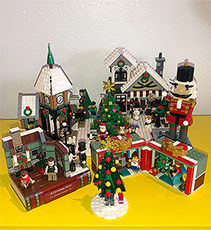
It is the time of the year when we have to endure mass amounts of ignorance.
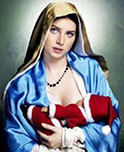

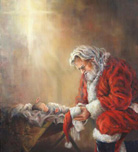
Every year, Fox News, seeking to appease their ignorant viewers and stir up anger throughout the land, uncovers 'evidence' of a 'War on Christmas'. But, it is those defending Christmas who are not being true to their traditions and teachings. Christmas, as we celebrate it today, owes more to Charles Dickens, Clement Moore, and Thomas Nast than to the church. Our major solstice holiday is a ‘cultural creation' rather than a sectarian ceremony. Mistakenly believing that Christmas is sacred, those who defend it find themselves propping up the absurd and ridiculous. The Christ they want back in Christmas is a product not of Nazareth but of fanatics who just don't know any better. And, all the whining and complaining about people 'stealing' Christmas, or declaring war, does not make the season any more religious. Here are some of the major issues:
The actual reason for the season is an ancient Pagan festival celebrating a good fall harvest. Biblical scholars acknowledge that Jesus was born in the spring. It was never stated in the Bible that Jesus was born on the 25th of December. It was Pope Julius the First who initiated this common belief - he declared in the year 350 CE that December 25 was the official Christmas date. Even Pope Benedict recently admitted that the Christian calendar was based on erroneous information. Early devout Christian sects even refused to celebrate Christmas as it was not Biblical nor respectful of their faith. Most of the season's trappings - Santa, tree, decorations, cards, feasting, parties, and endless shopping were swiped from other cultural traditions or added by retailers.
It's impossible to "put Christ back in Christmas." He was never there. He never heard the word Christmas during his lifetime on earth, nor did his apostles. You can search the Bible cover to cover but you won't find the words Christmas, Christmas tree, mistletoe, Santa Claus, or flying reindeer.
The Bible nowhere tells us to observe a holiday celebrating Jesus Christ's birth - but it clearly does tell us to commemorate His death. God even condemns using pagan customs to worship Him.


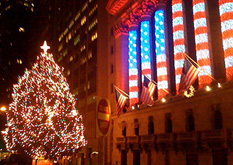
It is not an attempt to remove Christ from Christmas. In Greek, 'x' is the first letter in Χριστ?ς (translated as 'Christ'), an abbreviation for Christ. X is simply the Greek symbol Chi which represents Christ. Xmas takes up less space so advertisers can put more into their ads. But, its not particularly disrespectful nor irreligious; its just different.
There is almost nothing we do during this time, except for maybe donating to charities, that Jesus has asked us to do or would do himself. This cultural holiday of spending money, transferring stuff, overeating gluttony, racking up massive credit card debt, and partying is certainly not very Christ-like.
On property that is taxpayer-supported, there should not be displays that favor a specific religion over any other. No taxpayer should be intentionally and unfairly excluded and slighted by the government. There are plenty of places to display religious scenes and artifacts: churches (where it makes the most sense), private businesses, homes, etc. Public displays are okay if all beliefs are allowed to participate. However, when atheists or another religion posts a display on public property, Christians complain and ask that the non-Christian display be removed or that none at all be displayed (as it should be).

Jesus, a bastard child, commands us to leave our families to follow him. Please read any of these verses: Matthew 19:29, 10:21, and 10:34-37, Mark 10:29-30 and 13:12, and Luke 12:51-53, 14:26, 18:29-30, and 21:16. Despite the clear Biblical teachings, we have rebranded the Christmas season as one for family. An admirable and desirable goal, but not associated with Jesus, his teachings, or the Bible.
Since Christmas is more of a cultural season than a religious one, Merry Christmas doesn't have to be literal. There are no authentic Biblical Holy Days associated with December 25 but there are other religious holidays at this time, so Happy Holidays (Holy Days) also has merit. Either one works just fine, although many insecure and ignorant Christians get upset if someone says, "Happy Holidays".
In a situation where one knows the religious beliefs of the other, it is most appropriate to say Merry Christmas, Happy Hanukkah, Blessed Eid, or whatever. However, in a public place, one won't always know another's beliefs. In those instances, it may be more respectful and appropriate to wish them a Happy Holiday (Holy Day). One's personal spiritual beliefs should not dictate how others behave in public. Relax a bit, and enjoy this wonderful time of year. So what if others don't use the phrase you prefer? Will that harm your beliefs or how you celebrate Christmas? I hope not. Jesus taught us to love others and be patient with them - not to be sick and disturbed by them.
Please enjoy the beauty, excitement, joy, and festivities of the Christmas/holiday season, but please don't mistake it for an authentic historical religious observance.
Christmas is a baby shower that went totally overboard.
Before it became a major shopping holiday, Christmas is believed to have had some 'religious' meaning.
From the Andy Borowitz report
I wonder how many letters Satan gets this time a year from dyslexic children.
From Matthew McKim
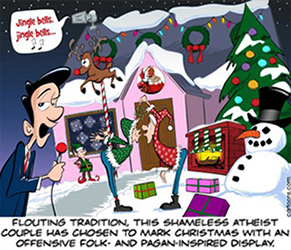


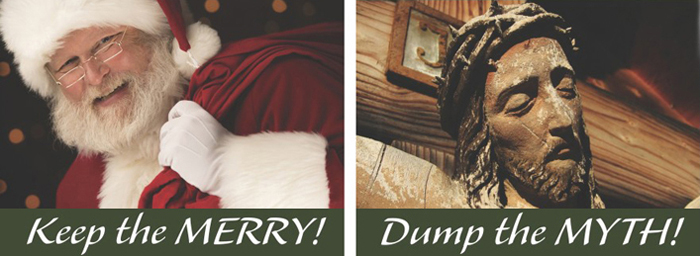
Displays of arrogant ignorance



Every Christmas season, two skyscrapers in Oklahoma City turn on lights on their facades that form Christian crosses. Unfortunately, they serve as large beacons of ignorance and bigotry in Oklahoma. Notice that the new tallest Devon Tower, a global company, has no religious symbols among its elaborate Christmas decorations. A few concerns:
As shown below, downtown Ft Worth displayed a similar cross on a building. This photo was shot in the 1950s. The same period the Red Scare (Communism) motivated the USA Congress to add 'Under God' to the Pledge of Allegiance and adopt 'In God We Trust' as a national motto.
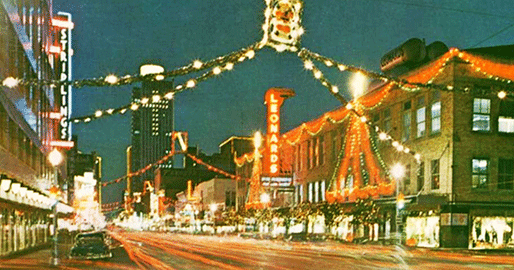
Why not Christmas birth stars instead of Easter death crucifixes?
How simple it would be to replace the crucifixes of death with the Christmas Star of birth. This would better reflect the joy and life of Christmas. Although it would still convey that Oklahoma City is not a very diverse respectful city.
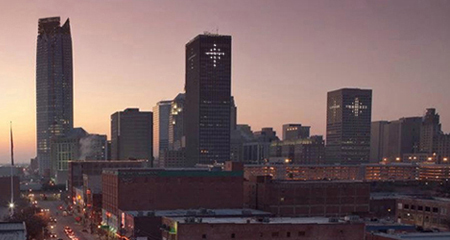
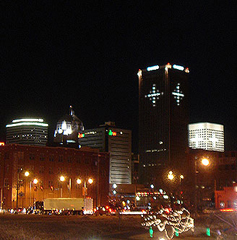
But, that is probly just too logical and thoughtful. Even though this simple change would be more appropriate, Okies would likely see it as another attack in the War on Christmas and demand that Christ (as represented by the death crucifix) be kept in the season. Of course, this attitude just highlights the ignorance about Christmas.
Santa Claus vs Jesus Christ
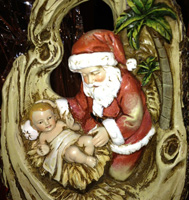
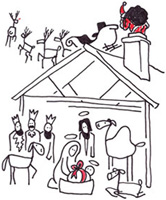
Similarities between Santa & Jesus
• Popular cult icons, each an integral part of Western culture.
• Introduced to the world by stories in a book and perpetuated by folk tales and generations of embellishments
• Bearded
• Encourage goodness, reward good behavior
• Judgmental: coal or present, heaven or hell; keeps a list of who's naughty and nice
• Celebrated on December 25
• Honored in song: gospel and carols
• Superhuman: can fly, conquer death, never die
• Miracle performers: squeezing into chimneys, water to wine, thousands of fish, thousands of presents
• Both believed in and worshipped by children, neither believed in by intelligent adults
Differences between Santa & Jesus
• The origin of Santa is based on a real person who was benevolent, loving, and giving; with documented evidence. The origin of Jesus is based on a story, written by religious advocates, decades after his death. No validating information was recorded during Jesus' life.
• Children are eager to go see Santa & they get quite excited. Kids worship Santa with more excitement. Santa's gifts are more desired by children. Children need to be forced, lied to, or threatened to go to church or Sunday school. They don't go to see Jesus.
• There is no common knowledge of Santa losing his temper. Jesus lost his temper in the temple with the moneychangers.
• Santa is often portrayed with his wife, a loving nurturing woman; portraying family values. Jesus never even married nor spent much time with his family.
• Their claims are different: If one chooses not to worship Santa, there are no serious negative consequences (maybe a lump of coal). If one chooses not to worship Jesus, he/she is destined to go to hell and suffer for all eternity.
As one becomes an adult one acknowledges that Santa is nothing more than a fun fairy tale. Adults reject worshiping Santa. But many adults continue to deceive kids into believing Santa is real. Jesus, who is real only in belief systems and is no more 'real' than Santa, continues to be worshiped by some adults.
Maybe we need a new religion: Clausianity. To worship Santa. Both Santa and Jesus are folk tales with similar backgrounds and powers. So, lets worship the one that is more jolly, more fun, more joyous, and more celebrated. The worship centers can be fun fantasy North Pole villages. There are already plenty of Santa/winter/Frosty songs to put in the hymnal.
Christmas before Christ
By Jerold Aust, Good News magazine, edited by Jim Watson
If people insist on defending Christmas, at least they should know how it originated. Christmas actually predates Christianity by about 2,000 years. Many ancient nations created their own midwinter festivals and celebrations - which later morphed into Christmas - to honor the sun and other gods around the time of the winter solstice.
The date
It's commonly assumed that Christmas is celebrated because it's the birthday of Jesus Christ. But biblical scholars overwhelmingly believe that Jesus was born nowhere near December 25. Luke's Gospel tells us that Joseph and Mary were traveling to Bethlehem to register during a Roman census when Jesus was born, and also that shepherds still had their flocks out in the open fields at that time (Luke 2:1-8). But the Holy Land in December is cold, rainy, and sometimes snowy. No sane shepherd would leave his flock in the fields at night at that time of year. And no intelligent ruler would compel people to travel many miles to register for a census when the likelihood of bad weather would have made such an effort dangerous.
It was a custom of the heathen to celebrate on the 25th of December the birthday of the Sun, at which they kindled lights in token of festivity. The Christians also took part in these festivities. When the theologians of the Church saw that the Christians participated in this festival, they resolved that the true Nativity should be solemnized on that day and the festival of the Epiphany on the 6th of January. The Christian Church chose to celebrate the birthday of its Founder on the 25th of December in order to transfer the devotion of the heathen from the Sun to him who was called the Sun of Righteousness.
This was despite God's direct warning against adopting pagan worship customs to honor Him (Deuteronomy 12:29-32).
Pagan festivals
A nativity celebration for pagan gods was observed near the winter solstice in both Syria and Egypt, long before the birth of Jesus Christ. Later, some 400 years before Christ, the Mithra religion, centering on the Persian sun god Mithras, provided the foundation for the Christmas celebration. Mithraism became very popular in the Roman Empire, and many elements of its worship survive today. The pagan sun god Mithras and the goddess Astarte were two of several deities worshiped on December 25 in the ancient world. The Egyptian god Horus, symbol of the reborn sun, was believed to have been born at the winter solstice.
In the Julian calendar, the 25th of December was the winter solstice, and it was regarded as the Nativity (birth day) of the Sun, because the day begins to lengthen and the power of the sun to increase from that turning-point of the year. The ritual of the nativity, as it appears to have been celebrated in Syria and Egypt, was remarkable. The Egyptians even represented the new-born sun by the image of an infant which on his birthday, the winter solstice, they brought forth and exhibited to his worshipers. No doubt the Virgin who thus conceived and bore a son on the twenty-fifth of December was the great Oriental goddess whom the Semites called the Heavenly Virgin or simply the Heavenly Goddess.
The Christmas holiday has its origin in two ancient pagan festivals, the great Yule-feast of the Norsemen and the Roman Saturnalia. Christmas was close enough to the winter solstice to acquire many of the associations of the Norse ceremony: the Yule-log, the evergreen decorations in houses and churches, even the Christmas feast itself. These elements were combined with the Saturnalia of the Romans to provide the basis for the early Christian festival. During the Saturnalia, gifts were made by the wealthy to the poor in honor of the golden age of liberty when Saturn ruled the known world, and slaves were allowed to change places and clothing with their masters.
Naturally it came under heavy censure from the early Church and despite the fact that Jesus and the saints gradually replaced the pagan deities, it was long considered completely out of character with the Christian ideal. However, the festival was far too strongly entrenched in popular favor to be abolished, and the Catholic Church finally granted the necessary recognition, believing that if Christmas could not be suppressed it should be altered to honor the Christian God.
Jesus neither observed Christmas nor taught others to observe it. Jesus explicitly warned against adopting pagan worship customs to honor the true God (Deuteronomy 12:29-32).
Christians stole Christmas.
We don't like their pretense that it is the birthday of Jesus. It is the Birthday of the Unconquered Sun - Dies Natalis Invicti Solis. Christmas is a relic of sun worship. For all of our major festivals, there were corresponding pagan festivals tied to natural events. We've been celebrating the Winter Solstice, this natural holiday, long before Christians crashed the party. For millennia, our ancestors in the Northern Hemisphere have greeted this seasonal event with festivals of light, gift exchanges and seasonal gatherings.
The Winter Solstice is the reason for the season
Occurring on December 21 or 22, the Winter Solstice, heralds the symbolic rebirth of the Sun, the lengthening of days and the natural New Year. We nonbelievers are quite willing to celebrate the fun parts of anybody's holidays. We just want to be spared the schmaltz, die superstition - and the state/church entanglements. The customs of this time of year endure because they are pleasant customs. It's fun to hear from distant family and friends, to gather, to feast, to sing. Gifts, as freethinker Robert Green Ingersoll once remarked, are evidences of friendship, of remembrance, of love. The evergreens displayed now as in centuries past flourish when all else seems dead, and are symbols, as is the returning sun, of enduring life. In celebrating the Winter Solstice, we celebrate reality.
What is the Winter Solstice? "Sol," in Latin, means sun. Witnessed from the northern hemisphere at the time of the Winter Solstice, the sun appears to stop its southerly drift for a day or two, before it returns north. Hence the word "stice," from the Latin for "stand still.' The Winter Solstice is the moment when the sun . appears at its most extreme southernmost position from the Equator, creating the year's longest night.
The Summer Solstice six months later marks the longest day. The sun's "migration" north to south relative to the Earth is caused by the rotation of the Earth on its tilted axis as it orbits the sun. (The vernal and autumnal equinoxes are the midpoints, when daylight and nighttime are equal.) Today the Winter Solstice in the Northern Hemisphere is popularly known as "the first day of winter." The Winter Solstice took place on December 25 at the time the Julian calendar was adopted by Julius Caesar in 46 BCE. The Julian calendar was off by 11 minutes per year. In 1582, by the time Pope Gregory established the Gregorian calendar, the Julian calendar was out of sync by ten days. The pope's remedy of deleting ten days from the calendar year 1582 established the solstice on December 22.
Keep Saturn in Saturnalia
Many of the Winter Solstice traditions coincide with agricultural seasons and hardest. The year's end is a natural time to store harvests, rest from farm work, feast and party. The best known Winter Solstice custom was the Roman festival of Saturnalia, taking place for a week. The celebrations featured role reversals for masters and slaves, feasts, drinking, bonfires, family parties, and gift-giving, decorating with evergreens and candles. In 350, Pope Julius I named December 25 as the day to celebrate the nativity. Emperor Justinian made Christmas a civic holiday after Christianity became the official religion of the Roman Empire in the fifth century. Notes James Frazier in The Golden Bough, "it appears that the Christian Church chose to celebrate the birthday of its Founder on the twenty-fifth of December in order to transfer the devotion of the heathen from the Sun to him who was called the Sun of Righteousness." Frazier conjectures that for the same motives, "the Church may have consciously adapted the new festival [of Easter] to its heathen predecessor for the sake of winning souls to Christ." Nothing in the New Testament refers to the nativity as occurring in wintertime. In fact, when "shepherds watched their flocks at night" was likely early spring or fall. Christmas (a word absent from the New Testament) is celebrated on December 25 because, as Frazier put it: "Taken altogether, the coincidences of the Christian with the heathen festivals are too close and too numerous to be accidental. They mark the compromise which the Church in the hour of its triumph was compelled to make with its vanquished yet still dangerous rivals." "It is obvious that the babe in the manger and the babe in the diaper with a New Year's banner around his chest are really the same - a symbol of the reborn sun god," wrote Lee Carter ("The Winter Solstice and the Origins of Christmas," Fall 1985 Free Inquiry). "Some of the major gods who celebrated their birthdays on December 25 were Marduk, Osiris, Horns, Isis, Mithras, Saturn, Sol, Apollo, Serapis, and Huitzilopochli."
Christmas trees aren't Christian
What is now the ubiquitous American practice of placing a decorated tree in one's home was popularized here and in England in the 19th century by Germans, such as Queen Victoria's husband. But the roots of this custom, so to speak, were pagan. Besides Teutonic (German) peoples, Celts and Druids were among many ancient "heathens" who engaged in various forms of tree-worship. Evergreens were widely used as winter decorations by many in Northern Europe, including the Vikings. The Old Testament harshly warns of such idolatry: "Learn not the way of the heathen. .. Their customs are vain; for one cuts a tree out of the forest ... they deck it with silver and with gold.. ."Jeremiah 10:2-5. The obvious pagan origins of Christmas revelry and customs were why the Puritans outlawed any observance of December 25 other than a church service.
Celebrating what is human
The 19th century's most famous "infidel," Robert Ingersoll, wrote "A Christmas Sermon," published in the Evening Telegram, Dec. 19, 1891, noting: "The good part of Christmas is not always Christian - it is generally Pagan; that is to say, natural. . . . 'Long before Christ was born the Sun-God triumphed over the powers of Darkness. About the time that we call Christmas the days begin perceptibly to lengthen. Our barbarian ancestors were worshipers of the sun, and they celebrated his victory over the hosts of night. Such a festival was natural and beautiful. The most natural of all religions is the worship of the sun. Christianity adopted this festival. It borrowed from the Pagans the best it has." As Ingersoll said: "I am in favor of all the good free days' - the more the better."
© 2012 by Annie Laurie Gaylor and FFRF
Christmas gains acceptance
The strange story of Christmas continued after the ancient celebrations were adopted by the Catholic Church. Christmas began at a time when the cult of the sun was particularly strong in Rome. Christmas gained official recognition and the name was substituted for the ancient heathen midwinter festival. Once given a Christian basis the festival became fully established in Europe with many of its pagan elements undisturbed. In the 4th century December 25 was decreed to be the birthday of Christ, and after 500 years the term Midwinter Feast was abandoned in favor of the word Christmas.
Most of today's Christmas customs (decorated trees, garlands, yule logs, carols, gift-giving, feasts) are not Christian customs, but heathen customs which have been absorbed or tolerated by the Church. The pagan elements in Christmas had often provoked criticism from extreme Protestants but the festival was not really affected by their beliefs until the Puritans came to power in the 17th century in England. Christmas was attacked as 'the old heathens' feasting day to Saturn their God and carols were forbidden. In 1644, December 25 was proclaimed as a day of abstaining from food and festivity to focus on religious devotion. The new rule was enforced by the army, which spent much of its time pulling down the greenery that festive 'pagans' had attached to their doors. This anti-Christmas attitude spread to Puritan territories in America. The Church established special services for Christmas in Boston during the 1690s, but many civil authorities strongly opposed this move. And it was not until some 150 years later that Christmas first became a legal holiday in the United States, in some states as late as 1836.
When Americans banned Christmas
From The Week 2011: The original 'War on Christmas' happened almost 400 years ago
The first settlers didn't celebrate Christmas. The Pilgrims who came to America in 1620 were strict Puritans, with firm views on religious holidays such as Christmas and Easter. Scripture did not name any holiday except the Sabbath, they argued, and the very concept of "holy days" implied that some days were not holy. "They for whom all days are holy can have no holiday," was a common Puritan maxim. They banned their flock from any celebration of Christmas throughout the 17th and 18th centuries. On the first December 25 the settlers spent in Plymouth Colony, they worked in the fields as they would on any other day. The next year, a group of non-Puritan workmen caught celebrating Christmas with a ball game were punished by Governor William Bradford.
Puritans in the English Parliament eliminated Christmas as a national holiday in 1645, amid widespread anti-Christmas sentiment. Settlers in New England went even further, outlawing Christmas celebrations entirely in 1659. Anyone caught shirking their work duties or feasting was forced to pay a significant penalty of five shillings. Christmas returned to England in 1660, but in New England it remained banned until the 1680s. Anti-Christmas sentiment flared up again around the time of the American Revolution. Colonial New Englanders began to associate Christmas with royal officialdom, and refused to mark it as a holiday. Even after the US Constitution came into effect, the Senate assembled on Christmas Day in 1797, as did the House in 1802. It was only in the following decades that disdain for the holiday slowly ebbed away. Clement Clarke Moore's poem "A Visit From St. Nicholas" ('Twas the Night Before Christmas) was published in New York in 1823 to enormous success. In 1836, Alabama became the first state to declare Christmas a public holiday, and other states soon followed suit. But New England remained defiantly Scrooge-like; as late as 1850, schools and markets remained open on Christmas Day. Henry Wadsworth Longfellow finally noted a "transition state about Christmas" in New England in 1856. "The old Puritan feeling prevents it from being a cheerful, hearty holiday; though every year makes it more so," he wrote. Christmas Day was formally declared a federal holiday by President Ulysses S. Grant in 1870.
Christmas trees were seen as a symbol of pagan idolatry. In Ohio it was not until 1851 that a pastor dared to put a decorated tree inside his Cleveland church. His act was met with local outrage. The tree, said one newspaper, was a "nonsensical, asinine, moronic absurdity." The editors castigated Lutherans for "groveling before a shrub." He was forced to take it down, but the following year he convinced community leaders to relent by arguing that the Christmas tree was a long-held Christian tradition in his native country. Yet the concerns he encountered persisted among some Christians well into the 20th century. They point to Jeremiah 10:1-4, which condemns the "vanity" of cutting down a "tree from the forest" and decorating it with silver and gold.
Black Friday Eve - overeating, television, and shopping - a true American holiday
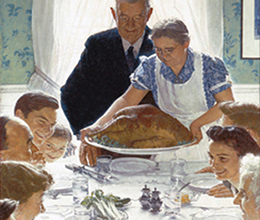
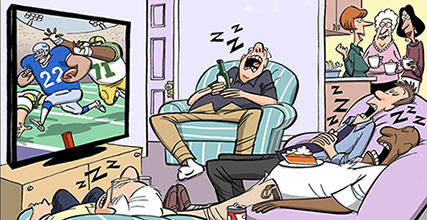
Black Friday Eve is a great holiday, well, at least for men. Here's how the day often goes for them: easy morning - no work, can sleep late and read the paper, maybe watch a little football preview. Breakfast is fairly minor since they'll be pigging out in the afternoon - gotta make room. The primary chores for men are to, maybe, help with cooking the turkey and carrying the food dishes from the car to the host's home. At that point the females in the clan take over and continue the cooking, preparation and serving. The kids in the crowd wander off to a kid's room or outside to play. The men amble into wherever the largest screen TV is and notice the appetizers laid out. The host offers a drink. Sure, thanks. The day of feasting begins. The men eventually, after some small talk, settle into some comfy chairs and watch the television, which had been on the entire time, but is now commanding attention. "Who will win, Hope his injuries have healed, Could you believe that catch last week." Because no one has eaten much today, the men are scarfing down the appetizers and starting to feel the drinks on their mostly-empty stomachs. Soon, the men are called from their comfort to find their seats in the dining room. The next hour or so is nothing but a pig-out AYCE banquet. There is more food than the entire extended family could eat, and that includes the weird cousins from upstate. At some point towards the end of the feast, the diners are warned to save room for dessert (since most contributing women in the family brought two different options). Despite some groans, most are looking forward to that course of the meal. But first, let's take a break from our bacchanalia. The men return to their comfy chairs to watch some football, the actual game now. The women clear the table, do some of the dishes, and begin to package up the leftovers to distribute among the guests. When they are through with that, they set up the dessert buffet. During a break in the game, the men struggle up out of their chairs and get a plate of several pie slices, with whipped cream. For those guys that don't drift off to sleep, the end of the game often signals the end of the banquet. The leftovers are distributed and the men are put back to work - carrying the dishes to their cars. A fun satisfying day (for the men).
In my parent's later years, my father, a semi-minimalist, and I would suggest to my mom that we should just go to the cafeteria and avoid the shopping, prep, cooking, and clean-up. She, being the traditionalist, would never agree. Cartoon above by Jeff Parker, Florida Today
www.jamesrobertwatson.com/christmas.html